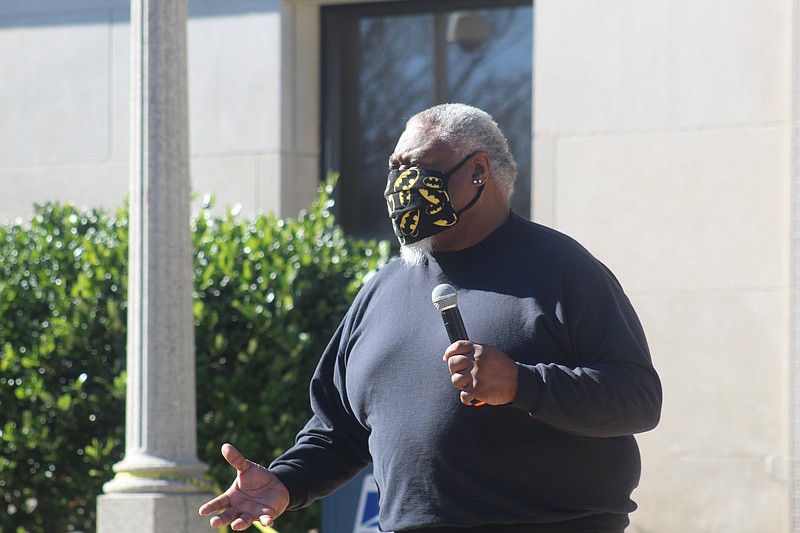A program to honor Dr. Martin Luther King was held outside the Union County courthouse on Monday and featured several speakers.
The theme of the program, according to organizer Jacarllus Hill in his opening remarks, was “Still Climbing,” a reference to King’s “I’ve Been to the Mountaintop” speech.
The program was opened with a prayer by Rev. Daniel Willis.
The first speaker was El Dorado Mayor Veronica Smith-Creer, who focused in part on King’s legacy of service to others.
“Dr. King stood for peace and equality. We’re living in a day where people are looking for power, not service… Dr. King didn’t just have a dream, he put a lot of work in to make that a reality, for us. That means we can’t stop and there’s a lot of work to be done. Because of the privileges we have today, we need to be about service. The greatest among us is he or she who serves… It’s about service to all, not just the people who look like you, or the people who want want you want, but to everyone,” Smith-Creer said.
Council member Willie McGhee spoke next, recounting memories of his own mother and her reverence of Dr. King.
“I was adopted, [my mom] adopted me. She had a third-grade education, if that, but she was involved with community. She started the 4H, the Boy Scouts, she was a youth director; she was involved and lived the dream Dr. King was teaching,” McGhee said.
McGhee went on to relate his own mother’s accomplishments to the broader, multi-generation struggle for civil rights and justice.
“We’ll be judged by our character, not the color of our skin, our background or whether we are rich or poor… You can’t drive by all the time and say, ‘oh that looks bad, somebody should do something.’ Who is somebody- us. All of us has somebody that sacrificed a hell of a lot- your mother, father, grandparent- for us to have the privileges we take for granted. They didn’t get to reap the benefits, but in their mind they had a dream that [their] kids or grandparents will benefit from me standing,” McGhee said.
Hill spoke last, using his time to both remember Dr. King’s accomplishments while emphasizing the many challenges still ahead.
Hill extensively quoted from a sermon King delivered at the Dexter Avenue Baptist Church in Montgomery, AL before his trial for violating that state’s anti-boycotting law.
“In a very profound passage, which has been often misunderstood, Jesus utters this. He says ‘Think not that I am come to bring peace. I come not to bring peace, but a sword.’ Certainly he is not saying that he comes not to bring peace in the higher sense. What he is saying is: ‘I come not to bring this peace of escapism, this peace that fails to confront the real issues of life, the peace that makes for stagnant complacency.’ Then he says, I come to bring a sword—not a physical sword. Whenever I come a conflict is precipitated between the old and the new, between justice and injustice, between the forces of light and the forces of darkness. I come to declare war on evil. I come to declare war on injustice,” King said in the sermon.
Hill read this portion of King’s speech before addressing issues of inequality in Union County.
“Many people think because we’re in the small town of El Dorado we’re free from the issues of racial injustice, or because we don’t have as many issues with our police force here. If you want to look at the starkest contrast of racial inequity in this city, look at the poverty rate… Dr. King’s last initiative before he died was the Poor People’s Campaign,” Hill said.
Hill continued his remarks by focusing on the need to continue King’s last battle before he was assassinated, the fight against economic injustice.
“We have to understand justice is not simply an issue of black and white, it reaches through all classes and all races, and we must work together. Economic injustice runs just as deep as racial injustice in the history of this country, and we must work to end it. So many people have given their lives in the pursuit of economic justice - not just Dr. King,” Hill said.
